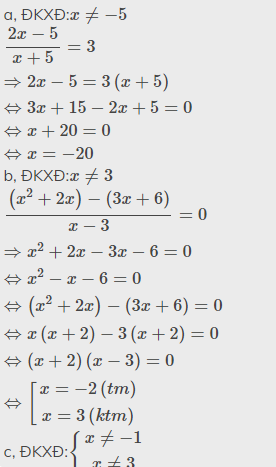Giải các phương trình:
Hãy nhập câu hỏi của bạn vào đây, nếu là tài khoản VIP, bạn sẽ được ưu tiên trả lời.


Bài `1:`
`h)(3/4x-1)(5/3x+2)=0`
`=>[(3/4x-1=0),(5/3x+2=0):}=>[(x=4/3),(x=-6/5):}`
______________
Bài `2:`
`b)3x-15=2x(x-5)`
`<=>3(x-5)-2x(x-5)=0`
`<=>(x-5)(3-2x)=0<=>[(x=5),(x=3/2):}`
`d)x(x+6)-7x-42=0`
`<=>x(x+6)-7(x+6)=0`
`<=>(x+6)(x-7)=0<=>[(x=-6),(x=7):}`
`f)x^3-2x^2-(x-2)=0`
`<=>x^2(x-2)-(x-2)=0`
`<=>(x-2)(x^2-1)=0<=>[(x=2),(x^2=1<=>x=+-2):}`
`h)(3x-1)(6x+1)=(x+7)(3x-1)`
`<=>18x^2+3x-6x-1=3x^2-x+21x-7`
`<=>15x^2-23x+6=0<=>15x^2-5x-18x+6=0`
`<=>(3x-1)(5x-1)=0<=>[(x=1/3),(x=1/5):}`
`j)(2x-5)^2-(x+2)^2=0`
`<=>(2x-5-x-2)(2x-5+x+2)=0`
`<=>(x-7)(3x-3)=0<=>[(x=7),(x=1):}`
`w)x^2-x-12=0`
`<=>x^2-4x+3x-12=0`
`<=>(x-4)(x+3)=0<=>[(x=4),(x=-3):}`
`m)(1-x)(5x+3)=(3x-7)(x-1)`
`<=>(1-x)(5x+3)+(1-x)(3x-7)=0`
`<=>(1-x)(5x+3+3x-7)=0`
`<=>(1-x)(8x-4)=0<=>[(x=1),(x=1/2):}`
`p)(2x-1)^2-4=0`
`<=>(2x-1-2)(2x-1+2)=0`
`<=>(2x-3)(2x+1)=0<=>[(x=3/2),(x=-1/2):}`
`r)(2x-1)^2=49`
`<=>(2x-1-7)(2x-1+7)=0`
`<=>(2x-8)(2x+6)=0<=>[(x=4),(x=-3):}`
`t)(5x-3)^2-(4x-7)^2=0`
`<=>(5x-3-4x+7)(5x-3+4x-7)=0`
`<=>(x+4)(9x-10)=0<=>[(x=-4),(x=10/9):}`
`u)x^2-10x+16=0`
`<=>x^2-8x-2x+16=0`
`<=>(x-2)(x-8)=0<=>[(x=2),(x=8):}`

\(a,\dfrac{x-3}{x}=\dfrac{x-3}{x+3}\)\(\left(đk:x\ne0,-3\right)\)
\(\Leftrightarrow\dfrac{x-3}{x}-\dfrac{x-3}{x+3}=0\)
\(\Leftrightarrow\dfrac{\left(x-3\right)\left(x+3\right)-x\left(x-3\right)}{x\left(x+3\right)}=0\)
\(\Leftrightarrow x^2-9-x^2+3x=0\)
\(\Leftrightarrow3x-9=0\)
\(\Leftrightarrow3x=9\)
\(\Leftrightarrow x=3\left(n\right)\)
Vậy \(S=\left\{3\right\}\)
\(b,\dfrac{4x-3}{4}>\dfrac{3x-5}{3}-\dfrac{2x-7}{12}\)
\(\Leftrightarrow\dfrac{4x-3}{4}-\dfrac{3x-5}{3}+\dfrac{2x-7}{12}>0\)
\(\Leftrightarrow\dfrac{3\left(4x-3\right)-4\left(3x-5\right)+2x-7}{12}>0\)
\(\Leftrightarrow12x-9-12x+20+2x-7>0\)
\(\Leftrightarrow2x+4>0\)
\(\Leftrightarrow2x>-4\)
\(\Leftrightarrow x>-2\)


⇔ (x + 3)(x – 3) + 2.3 = 3x(1 – x)
⇔ x 2 − 9 + 6 = 3 x − 3 x 2 ⇔ x 2 − 9 + 6 − 3 x + 3 x 2 = 0 ⇔ 4 x 2 − 3 x − 3 = 0
Có a = 4; b = -3; c = -3 ⇒ Δ = ( - 3 ) 2 – 4 . 4 . ( - 3 ) = 57 > 0
Phương trình có hai nghiệm

Điều kiện xác định: x ≠ 5; x ≠ 2.
Quy đồng và khử mẫu ta được :
(x + 2)(2 – x) + 3(2 – x)(x – 5) = 6(x – 5)
⇔ 4 − x 2 + 6 x − 3 x 2 − 30 + 15 x = 6 x − 30 ⇔ 4 − x 2 + 6 x − 3 x 2 − 30 + 15 x − 6 x + 30 = 0 ⇔ − 4 x 2 + 15 x + 4 = 0
Có a = -4; b = 15; c = 4 ⇒ Δ = 15 2 – 4 . ( - 4 ) . 4 = 289 > 0
Phương trình có hai nghiệm phân biệt:

Cả hai giá trị đều thỏa mãn điều kiện.
Vậy phương trình có tập nghiệm 

Điều kiện xác định: x ≠ -1; x ≠ -2.
Quy đồng và khử mẫu ta được:
4 ⋅ ( x + 2 ) = − x 2 − x + 2 ⇔ 4 x + 8 = − x 2 − x + 2 ⇔ 4 x + 8 + x 2 + x − 2 = 0 ⇔ x 2 + 5 x + 6 = 0
Có a = 1; b = 5; c = 6 ⇒ Δ = 5 2 – 4 . 1 . 6 = 1 > 0
⇒ Phương trình có hai nghiệm phân biệt:

Chỉ có nghiệm x 2 = - 3 thỏa mãn điều kiện xác định.
Vậy phương trình có nghiệm x = -3.

\(a,\left(x-6\right)\left(2x-5\right)\left(3x+9\right)=0\Leftrightarrow\left[{}\begin{matrix}x-6=0\Leftrightarrow x=6\\2x-5=0\Leftrightarrow x=\dfrac{5}{2}\\3x+9=0\Leftrightarrow x=-3\end{matrix}\right.\)
\(b,2x\left(x-3\right)+5\left(x-3\right)=0\Leftrightarrow\left(2x+5\right)\left(x-3\right)=0\Leftrightarrow\left[{}\begin{matrix}x-3=0\Leftrightarrow x=3\\2x+5=0\Leftrightarrow x=-\dfrac{5}{2}\end{matrix}\right.\)
\(c,x^2-4-\left(x-2\right)\left(3-2x\right)=0\Leftrightarrow\left(x-2\right)\left(x+2\right)-\left(x-2\right)\left(3-2x\right)=0\Leftrightarrow\left(x-2\right)\left(x+2-3+2x\right)=0\Leftrightarrow\left[{}\begin{matrix}x=2\\x=\dfrac{1}{3}\end{matrix}\right.\)
\(x=-7\left(2m-5\right)x-2m^2+8\Leftrightarrow x+7\left(2m-5\right)=8-2m^2\Leftrightarrow x\left(14m-34\right)=8-2m^2\)
\(ycđb\Leftrightarrow14m-34\ne0\Leftrightarrow m\ne\dfrac{34}{14}\)\(\Rightarrow x=\dfrac{8-2m^2}{14m-34}\)
\(3.17\Leftrightarrow4x^2-4x+1-2x-1=0\Leftrightarrow4x^2-6x=0\Leftrightarrow x\left(4x-6\right)=0\Leftrightarrow\left[{}\begin{matrix}x=0\\x=\dfrac{3}{2}\end{matrix}\right.\)
3.15:
a, \(\Leftrightarrow\left\{{}\begin{matrix}x-6=0\\2x-5=0\\3x+9=0\end{matrix}\right.\Leftrightarrow\left\{{}\begin{matrix}x=6\\x=\dfrac{5}{2}\\x=-\dfrac{9}{3}=-3\end{matrix}\right.\)
b, \(\Leftrightarrow\left(x-3\right)\left(2x+5\right)=0\)
\(\Leftrightarrow\left\{{}\begin{matrix}x-3=0\\2x+5=0\end{matrix}\right.\Leftrightarrow\left\{{}\begin{matrix}x=3\\x=-\dfrac{5}{2}\end{matrix}\right.\)
c, \(\Leftrightarrow\left(x-2\right)\left(x+2\right)-\left(x-2\right)\left(3-2x\right)=0\)
\(\Leftrightarrow\left(x-2\right)\left(x+2-3+2x\right)=0\)
\(\Leftrightarrow\left\{{}\begin{matrix}x-2=0\\3x-1=0\end{matrix}\right.\Leftrightarrow\left\{{}\begin{matrix}x=2\\x=\dfrac{1}{3}\end{matrix}\right.\)
3.16
\(\Leftrightarrow\left(2m-5\right).-7-2m^2+8=0\)
\(\Leftrightarrow-14m+35-2m^2+8=0\)
\(\Leftrightarrow-14m-2m^2+43=0\)
\(\Leftrightarrow-2\left(7m+m^2\right)=-43\)
\(\Leftrightarrow m\left(7-m\right)=\dfrac{43}{2}\)
\(\Leftrightarrow\dfrac{m\left(7-m\right)}{1}-\dfrac{43}{2}=0\)
\(\Leftrightarrow\dfrac{14m-2m^2}{2}-\dfrac{43}{2}=0\)
pt vô nghiệm

\(x-5=\frac{1}{3\left(x+2\right)}\left(đkxđ:x\ne-2\right)\)
\(< =>3\left(x-5\right)\left(x+2\right)=1\)
\(< =>3\left(x^2-3x-10\right)=1\)
\(< =>x^2-3x-10=\frac{1}{3}\)
\(< =>x^2-3x-\frac{31}{3}=0\)
giải pt bậc 2 dễ r
\(\frac{x}{3}+\frac{x}{4}=\frac{x}{5}-\frac{x}{6}\)
\(< =>\frac{4x+3x}{12}=\frac{6x-5x}{30}\)
\(< =>\frac{7x}{12}=\frac{x}{30}< =>12x=210x\)
\(< =>x\left(210-12\right)=0< =>x=0\)

Câu 1 :
a, \(\frac{3\left(2x+1\right)}{4}-\frac{5x+3}{6}=\frac{2x-1}{3}-\frac{3-x}{4}\)
\(\Leftrightarrow\frac{6x+3}{4}+\frac{3-x}{4}=\frac{2x-1}{3}+\frac{5x+3}{6}\)
\(\Leftrightarrow\frac{5x+6}{4}=\frac{9x+1}{6}\Leftrightarrow\frac{30x+36}{24}=\frac{36x+4}{24}\)
Khử mẫu : \(30x+36=36x+4\Leftrightarrow-6x=-32\Leftrightarrow x=\frac{32}{6}=\frac{16}{3}\)
tương tự
\(\frac{19}{4}-\frac{2\left(3x-5\right)}{5}=\frac{3-2x}{10}-\frac{3x-1}{4}\)
\(< =>\frac{19.5}{20}-\frac{8\left(3x-5\right)}{20}=\frac{2\left(3-2x\right)}{20}-\frac{5\left(3x-1\right)}{20}\)
\(< =>95-24x+40=6-4x-15x+5\)
\(< =>-24x+135=-19x+11\)
\(< =>5x=135-11=124\)
\(< =>x=\frac{124}{5}\)

1/a/\(\Leftrightarrow\left(x+5\right)\left(x+6\right)=0\)
\(\Leftrightarrow\orbr{\begin{cases}x+5=0\\x+6=0\end{cases}\Leftrightarrow\orbr{\begin{cases}x=-5\\x=-6\end{cases}}}\)
Vậy ...................
b/ ĐKXĐ:\(x\ne2;x\ne5\)
.....\(\Rightarrow3x^2-15x-x^2+2x+3x=0\)
\(\Leftrightarrow2x^2-10x=0\)
\(\Leftrightarrow2x\left(x-5\right)=0\)
\(\Leftrightarrow\hept{\begin{cases}2x=0\\x-5=0\end{cases}\Leftrightarrow\orbr{\begin{cases}x=0\left(nhận\right)\\x=5\left(loại\right)\end{cases}}}\)
Vậy ..............
`Answer:`
`1.`
a. \(\left(x+5\right)\left(2x+1\right)-x^2+25=0\)
\(\Leftrightarrow\left(x+5\right)\left(2x+1\right)-\left(x^2-25\right)=0\)
\(\Leftrightarrow\left(x+5\right)\left(2x+1\right)-\left(x+5\right)\left(x-5\right)=0\)
\(\Leftrightarrow\left(x+5\right)\left(2x+1-x+5\right)=0\)
\(\Leftrightarrow\left(x+5\right)\left(x+6\right)=0\)
\(\Leftrightarrow\orbr{\begin{cases}x+5=0\\x+6=0\end{cases}\Leftrightarrow\orbr{\begin{cases}x=-6\\x=-5\end{cases}}}\)
b. \(\frac{3x}{x-2}-\frac{x}{x-5}+\frac{3x}{\left(x-2\right)\left(x-5\right)}=0\left(ĐKXĐ:x\ne2;x\ne5\right)\)
\(\Leftrightarrow\frac{3x\left(x-5\right)}{\left(x-2\right)\left(x-5\right)}-\frac{x\left(x-2\right)}{\left(x-2\right)\left(x-5\right)}+\frac{3x}{\left(x-2\right)\left(x-5\right)}=0\)
\(\Leftrightarrow\frac{3x\left(x-5\right)-x\left(x-2\right)+3x}{\left(x-2\right)\left(x-5\right)}=0\)
\(\Leftrightarrow3x\left(x-5\right)-x\left(x-2\right)+3x=0\)
\(\Leftrightarrow3x^2-15x-x^2+2x+3x=0\)
\(\Leftrightarrow2x\left(x-5\right)=0\)
\(\Leftrightarrow\orbr{\begin{cases}2x=0\\x-5=0\end{cases}\Leftrightarrow\orbr{\begin{cases}x=0\\x=5\text{(Không thoả mãn)}\end{cases}}}\)
`2.`
\(ĐKXĐ:x\ne-m-2;x\ne m-2\)
Ta có: \(\frac{x+1}{x+2+m}=\frac{x+1}{x+2-m}\left(1\right)\)
a. Khi `m=-3` phương trình `(1)` sẽ trở thành: \(\frac{x+1}{x-1}=\frac{x+1}{x+5}\left(x\ne1;x\ne-5\right)\)
\(\Leftrightarrow\orbr{\begin{cases}x+1=0\\\frac{1}{x-1}=\frac{1}{x+5}\end{cases}\Leftrightarrow\orbr{\begin{cases}x+1=0\\x-1=x+5\end{cases}}\Leftrightarrow\orbr{\begin{cases}x=-1\\-1=5\text{(Vô nghiệm)}\end{cases}}}\)
b. Để phương trình `(1)` nhận `x=3` làm nghiệm thì
\(\Leftrightarrow\hept{\begin{cases}\frac{3+1}{3+2-m}=\frac{3+1}{3+2-m}\\3\ne-m-2\\3\ne m-2\end{cases}}\Leftrightarrow\hept{\begin{cases}\frac{4}{5+m}=\frac{4}{5-m}\\m\ne\pm5\end{cases}}\Leftrightarrow\hept{\begin{cases}5+m=5-m\\m\ne\pm5\end{cases}}\Leftrightarrow m=0\)

a: ĐKXĐ: \(x\notin\left\{3;-5\right\}\)
\(\dfrac{x+5}{3}-\dfrac{x-3}{5}=\dfrac{5}{x-3}-\dfrac{3}{x+5}\)
=>\(\dfrac{5\left(x+5\right)-3\left(x-3\right)}{15}=\dfrac{5\left(x+5\right)-3\left(x-3\right)}{\left(x-3\right)\left(x+5\right)}\)
=>\(\dfrac{5x+25-3x+9}{15}=\dfrac{5x+25-3x+9}{\left(x-3\right)\left(x+5\right)}\)
=>(x-3)(x+5)=15
=>\(x^2+2x-15-15=0\)
=>\(x^2+2x-30=0\)
=>\(\left(x+1\right)^2=31\)
=>\(\left[{}\begin{matrix}x+1=\sqrt{31}\\x+1=-\sqrt{31}\end{matrix}\right.\Leftrightarrow x=-1\pm\sqrt{31}\left(nhận\right)\)
b: ĐKXĐ: \(x\in R\)
\(\sqrt{x^2+x+1}=3-x\)
=>\(\left\{{}\begin{matrix}x^2+x+1=\left(3-x\right)^2\\x< =3\end{matrix}\right.\)
=>\(\left\{{}\begin{matrix}x< =3\\x^2-6x+9=x^2+x+1\end{matrix}\right.\)
=>\(\left\{{}\begin{matrix}x< =3\\-7x=-8\end{matrix}\right.\Leftrightarrow x=\dfrac{8}{7}\left(nhận\right)\)
c:
ĐKXĐ: \(x\in R\)
\(x^2-x+\sqrt{x^2-x+24}=18\)
=>\(x^2-x+24+\sqrt{x^2-x+24}=42\)
=>\(\left(\sqrt{x^2-x+24}\right)^2+\left(\sqrt{x^2-x+24}\right)-42=0\)
=>\(\left(\sqrt{x^2-x+24}+7\right)\left(\sqrt{x^2-x+24}-6\right)=0\)
=>\(\sqrt{x^2-x+24}-6=0\)
=>\(x^2-x+24=36\)
=>\(x^2-x-12=0\)
=>(x-4)(x+3)=0
=>\(\left[{}\begin{matrix}x-4=0\\x+3=0\end{matrix}\right.\Leftrightarrow\left[{}\begin{matrix}x=4\left(nhận\right)\\x=-3\left(nhận\right)\end{matrix}\right.\)

a, ĐKXĐ:\(x\ne-5\)
\(\dfrac{2x-5}{x+5}=3\\ \Rightarrow2x-5=3\left(x+5\right)\\ \Leftrightarrow3x+15-2x+5=0\\ \Leftrightarrow x+20=0\\ \Leftrightarrow x=-20\)
b, ĐKXĐ:\(x\ne3\)
\(\dfrac{\left(x^2+2x\right)-\left(3x+6\right)}{x-3}=0\\ \Rightarrow x^2+2x-3x-6=0\\ \Leftrightarrow x^2-x-6=0\\ \Leftrightarrow\left(x^2+2x\right)-\left(3x+6\right)=0\\ \Leftrightarrow x\left(x+2\right)-3\left(x+2\right)=0\\ \Leftrightarrow\left(x+2\right)\left(x-3\right)=0\\ \Leftrightarrow\left[{}\begin{matrix}x=-2\left(tm\right)\\x=3\left(ktm\right)\end{matrix}\right.\)
c, ĐKXĐ:\(\left\{{}\begin{matrix}x\ne-1\\x\ne3\end{matrix}\right.\)
\(\dfrac{x}{2\left(x-3\right)}+\dfrac{x}{2x+2}=\dfrac{2x}{\left(x+1\right)\left(x-3\right)}\\ \Leftrightarrow x\left(\dfrac{1}{2\left(x-3\right)}+\dfrac{1}{2\left(x+1\right)}-\dfrac{2}{\left(x+1\right)\left(x-3\right)}\right)=0\\ \Leftrightarrow x\left(\dfrac{x+1}{2\left(x-3\right)\left(x+1\right)}+\dfrac{x-3}{2\left(x+1\right)\left(x-3\right)}-\dfrac{4}{2\left(x+1\right)\left(x-3\right)}\right)=0\\ \Leftrightarrow x.\dfrac{x+1+x-3-4}{2\left(x-3\right)\left(x+1\right)}=0\\ \Leftrightarrow\dfrac{x\left(2x-6\right)}{2\left(x-3\right)\left(x+1\right)}=0\\ \Leftrightarrow\dfrac{2x\left(x-3\right)}{2\left(x-3\right)\left(x+1\right)}=0\\ \Leftrightarrow\dfrac{x}{x+1}=0\\ \Rightarrow x=0\left(tm\right)\)

Điều kiện : x ≠ 3 và x ≠ -2
Ta có: x 2 - 3 x + 5 x - 3 x + 2 = 1 x - 3 ⇔ x 2 -3x +5 = x+2 ⇔ x 2 -4x +3 =0
Phương trình x 2 -4x +3 = 0 có a = 1 ,b = -4 , c = 3
Suy ra : a + b + c = 0
Ta có nghiệm x 1 =1 , x 2 =3 (loại)
Vậy nghiệm của phương trình là x = 1